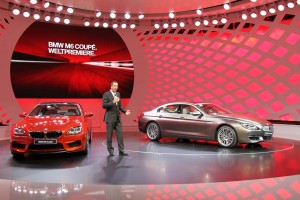
New products, like the M6 and 6-Series Grand Coupe, shown here at their Geneva debut, are driving record sales and earnings.
Despite the worsening economic crisis in Europe there was good news for two of the Continent’s most exclusive automotive manufacturers – BMW, in particular posting all-time record earnings for the first quarter.
Porsche, meanwhile, saw its own operating profit for the January to March quarter surge “only” 18% — that driven by strong demand for the Cayenne SUV despite near-record fuel prices in the key U.S. market and other parts of the world.
It was difficult to find anything that didn’t work out well for BMW during the first quarter – after the maker captured the luxury sales crown both in the U.S. and on the worldwide market in 2011. The first-quarter net profit was up 18% compared to year-earlier figures, to 1.34 billion euros, while pre-tax earnings were up 22%, to 2.08 billion euros. The maker’s EBIT, or Earnings Before Interest and Taxes, rose 19%, to 2.13 billion. And revenues jumped 14%, to 18.29 billion euros.
“We have recorded the best first-quarter figures ever — for sales volume, revenues and earnings — in the BMW Group’s corporate history,” said Norbert Reithofer, chairman of BMW’s management board, in a statement from the maker’s Munich headquarters.
It was, in fact, the most successful quarter ever for all three of BMW’s automotive brands, BMW, Rolls-Royce and Mini, the executive noted. And that has prompted the maker to set out even more aggressive goals going forward:
- It is targeting full-year record sales for all three brands;
- It is aiming for a pre-tax record for earnings in 2012;
- By 2016, Reithofer wants to achieve annual sales of at least 2 million vehicles.
- And, longer-term, BMW is aiming to maintain margins of anywhere from 8 to 10%.
The maker actually exceeded that level with margins – on an EBIT basis – of 11.6% during the first quarter.
The BMW Group sold 425,528 cars and crossovers during the first quarter, an 11.2% increase – and even managed to squeak out a 0.5% improvement in deeply troubled Europe.
The maker credited a range of new products, such as the latest generations of the 3-Series and 6-Series. And, if anything, it had to struggle with the inherent problems of launching new models such as the X5 and 3-Series Convertible during the quarter. Reithofer based his optimism for the full year on upcoming launches that also include the BMW 6-Series Gran Coupe, its first coupe-like sedan; an updated 7-Series; and the new Mini Roadster.
“First quarter results beat ours and consensus expectations on all lines,” said Jochen Gehrke, European auto analyst with Deutsche Bank.
But the analyst noted that in its upbeat forecast BMW also pointed to some potential downside issues including, “rising pricing risks, with negative pricing trends in Southern Europe now making inroads into other markets such as the UK and Germany showing also first signs of weakening.”
The same risks face Porsche despite what one analyst called “a fairly good set of numbers” for the first quarter. The 18% jump in the Stuttgart-based sports car maker’s operating profit brought it to 528 million euros, while revenues jumped 32%, to 3.03 billion. The maker did not release a net profit figure.
Porsche saw its average transaction prices rise for the quarter with the launch of strong new models, including the seventh-generation 911 and the latest version of its Cayenne. Unit sales jumped 29%, to 30,231 vehicles.
Porsche also revealed what may be the highest margins for any relatively mainstream automaker, the figure climbing to 17.5% for the quarter.
Nonetheless, the maker still has some issues outstanding, including ongoing lawsuits over its handling of a failed David-and-Goliath bid to take over rival Volkswagen AG. The two companies later agreed to a merger. But that has been put on hold due to the lawsuits and the marriage may never be consummated, many analysts now believe.

